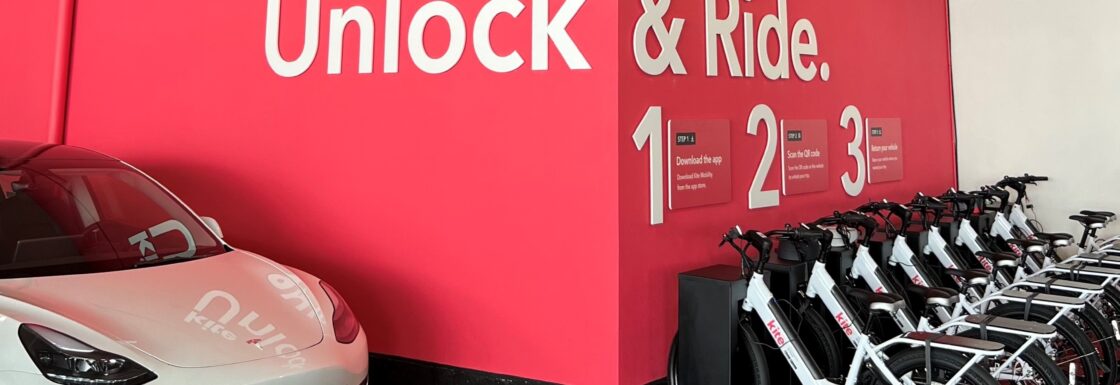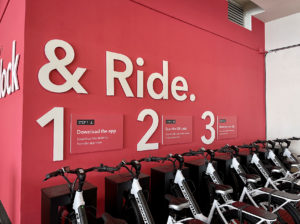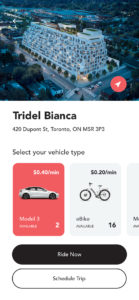A New Way to Access Sustainable Transportation

Projects Sponsor
Kite Mobility was founded in 2020 with a vision to make sustainable mobility convenient and accessible by bridging silos in the housing and transport sectors—the two largest greenhouse gas contributors in cities. By partnering with leading real estate developers and EV manufacturers, Kite designed a business model that offers the amenity of cost-efficient, shared electric cars and micro-mobility options to building residents. As of July 2022, Kite mobility has launched two successful projects in Canada. The shift away from privately owned vehicles to shared electric vehicles and micro-mobility modes is part of how we will get from A to net-Zero and Kite Mobility is helping to drive it.

Electric Bike Phases
There’s no question that transitioning away from internal combustion engine vehicles to EVs is part of what’s going to drive us to net-zero, but not all households can afford to finance EVs, and putting everyone is a different car—no matter how low its emissions—isn’t going to do anything to decongest city roads.
Enter Kite, via a download on your phone. Kite is an EV carshare service that optimises user experience by enabling residents of multi-unit residential buildings to access shared modes of electric transport at their buildings. By making it easy, affordable, and attractive for users to opt for sustainable transport options—reducing households’ dependence on private vehicle ownership and replacing car trips with micro-mobility modes—Kite promises to change the way we get about.
But let’s back up. Kite undertook numerous areas to research before starting up. They studied GHG emissions in the transport and buildings sector, city mandates and zoning bylaws. They looked closely at the rates at which we use our privately owned vehicles, what we pay for parking spaces, and for the cars we put in them when we find them. Kite also studied micro-mobility modes and the cost of other mobility service providers. The results indicated that Kite’s service and business model would offer a compelling value proposition to end users, real estate developers, and to cities throughout North America.
This transition would reduce GHG emissions, cut traffic and drastically curtail our hitherto insatiable need to construct emissions-generating and expensive parking infrastructure where people are trying to live.With all this in mind, knowing it’s time to change lanes, the Kite team created a business and financial model, developed the technology to support that new business model, then secured partners on the mobility (hello, Tesla, Zoomo); and partners on the building developer side (hello, Tridel). A vision that was easy to share helped Kite garner buy-in from various stakeholders. They needed and got insurance companies, hardware companies (including technology integration) and channel partners, including charging on board. Smart building as well as smart parking partners, real estate developers, investors, and employees came along for the ride.

App Schedule Trip Reservation Vehicle Selection
Kite then integrated their platform with smart buildings, charging infrastructure, hardware (eCars, eBikes, eScooters), then built out physical space. At the same time, they refined their digital space and worked to enhance their user experience. All of which ultimately led to a project in partnership with Tridel’s Bianca, a newly constructed nine storey, 216-unit, luxury condominium building in downtown Toronto. Despite only being at 50% occupancy, the partnership has seen a growing demand for Kite’s vehicles – which are a bonus amenity offered to Bianca’s residents – especially in the eBike space. This suggests that individuals are increasingly opting to replace their personal car trips with eBike trips. Additionally, interviews with building residents suggest that residents are far more likely to forgo costly, bothersome private vehicle ownership in favour of Kite’s shared electric modes of transport.
Increasing on-site communication with condo residents and the management team while concurrently hosting demonstration events to engage residents has continued to increase Kite usership. Kite has, in turn, increased their offering; as of July 2022, Kite has launched two successful projects in Canada. The easy availability of cost-efficient, shared electric cars and micro-mobility options to building residents offered by Kite is part of a much needed transformation in our travel behaviour.
The shift away from privately owned gas vehicles to shared electric vehicles and micro-mobility modes is part of how we will get from A to net-Zero, and Kite Mobility is helping to drive it.
















